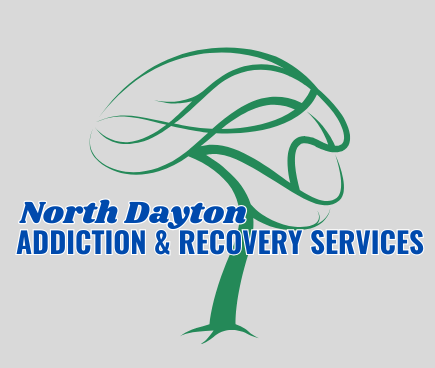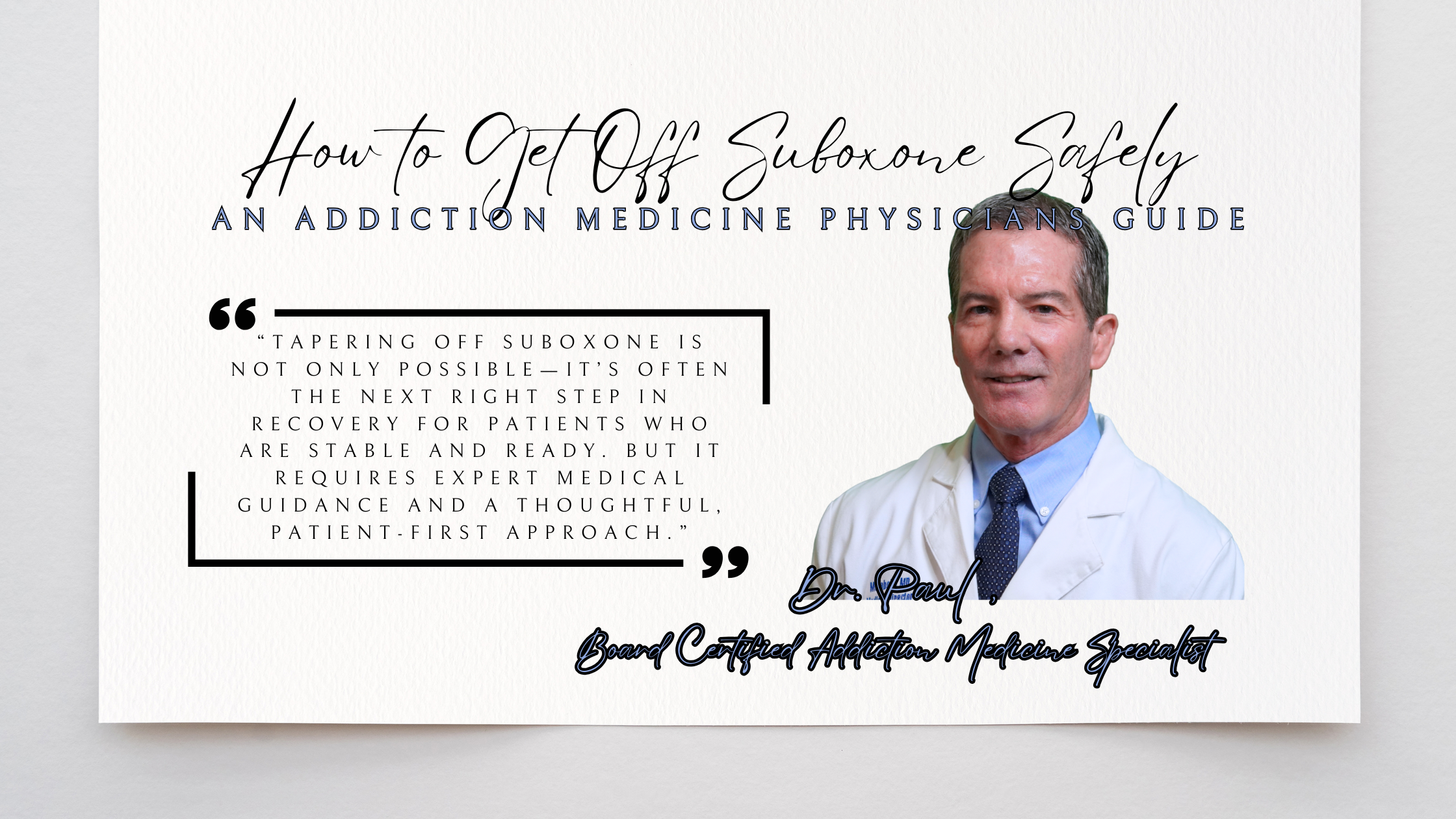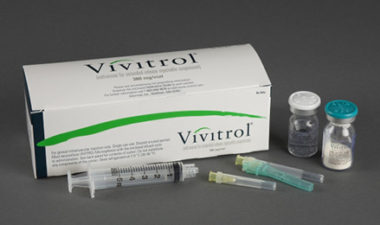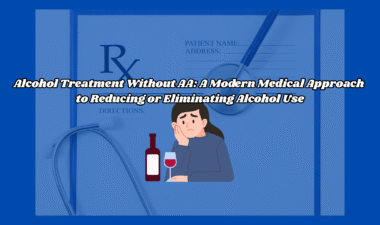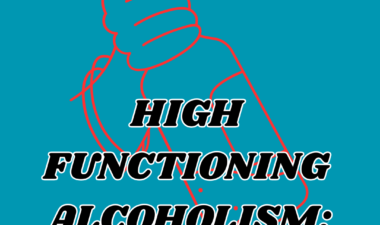How to Get Off Suboxone Safely: An Addiction Physician’s Guide

Paul Kolodzik, MD, Board-Certified in Addiction Medicine
Telemedicine Suboxone Tapering in Ohio & Indiana
Why Some Patients Choose to Stop Suboxone
Suboxone (buprenorphine/naloxone) is a proven and often life-saving medication for opioid use disorder. It stabilizes brain chemistry, prevents cravings, and dramatically reduces the risk of relapse.
But for many patients, Suboxone should not be a assumed to be a medication required for a lifetime. When individuals feel secure in their recovery, they often begin thinking about how to successfully taper off Suboxone and eventually move forward in life medication-free. As a Board-Certified Addiction Medicine physician, this is an area that has been a big part of my medical practice for the last 10 years. A tremendous amount of satisfaction is experienced by both physician and patient when the safe transition to being medication free is achieved.
There are a number of common reasons patients choose to taper off Suboxone. They include:
- A desire to live medication-free
- An interest in eliminating the cost of treatment
- An interest in eliminating the time commitment of monthly or even weekly medical provider visits
- A personal sense of readiness to move on
- Wanting to meet the challenge of overcoming opiate addiction without the ongoing need for medication
With the right technique and support, tapering off Suboxone can be safe, comfortable, and empowering. I know, I’ve helped hundreds of patients reach this goal.
A Medically Guided, Individualized Approach

Suboxone is a long-acting medication and must be reduced gradually. The safest and most successful tapers are done under the care of an experienced addiction medicine physician who understands not only the science but also the details of both the clinical and the emotional aspects of recovery.
As a board-certified in addiction medicine specialist, I have guided hundreds of patients in Ohio and Indiana through customized Suboxone tapers. The focus is always on the patient’s long-term wellbeing—never on indefinite maintenance when it’s no longer needed.
The Problem with High-Dose Maintenance
Unfortunately, some patients are placed—and kept—on high doses of Suboxone for extended periods, often without a clear plan for the goals of their recovery. In some cases, this is due to provider inexperience. In others, it’s part of a health care and business model that prioritizes patient retention over patient progress. It is not right, but some providers want a “returning customer” for life. One way to ensure that is to maintain patients on higher than necessary doses, and to not help the patient lowering their dosing to a level that might facilitate success in getting off the medication.
When Suboxone is prescribed at unnecessarily high doses and continued for years without discussion of tapering, it can make the process of getting off the medication almost impossible. I understand that some patients feel secure in their recovery by continuing treatment indefinitely. But why not do this at the lowest comfortable dose, so the option exists to taper off the medication if desired.
Working with a provider does not help them lower dosing safely, incrementally, and comfortably can leave patients feeling stuck—desiring to move forward, but unsure how to do so safely.
The truth is: many patients can and should taper down once they’re stable. Staying on high doses indefinitely is not always in the patient’s best interest when a gradual, physician-guided reduction is possible. This is what I have done with a large proportion of my patients for years.
And I’ve had dozens of patients come to me exclusively seeking to taper down and off medication, when their previous physician refused to provide this course of management.
What a Thoughtful Tapering Process Looks Like
There’s no universal schedule for getting off Suboxone. The taper must be tailored to the patient’s unique needs, history, and comfort level.
At North Dayton Addiction and Recovery, our process typically includes:
- Initial medical consultation via telehealth to assess history, current dose, and readiness
- A flexible and collaborative taper plan designed to move at the patient’s own pace.
- Monthly follow-ups by telemedicine to monitor progress and make adjustments as needed
- Short-term comfort medications when tapering to help manage occasional symptoms like sleep changes or anxiety
- Optional behavioral support or referrals, when needed or desired
Tapering off the medication can often take a number of months or even longer. The focus is always on long-term success, not speed. A return to the status of a craving for opiates or anything other than minimal withdrawal symptoms is always avoided.
Questions to Consider Before Tapering
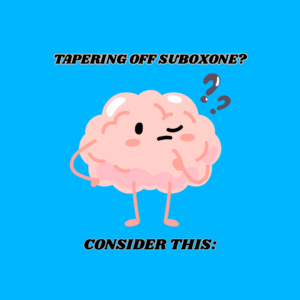
- Am I stable in my recovery and motivated to reduce?
- Is my current dose higher than I think is necessary for maintenance?
- Has my provider discussed a long-term plan for tapering?
- Am I receiving medical guidance from someone experienced in tapering Suboxone who has only my best interest in mind?
- Am I ready to go through the process slowly, with support?
Being informed and supported makes all the difference.
Final Thoughts
Tapering off Suboxone is not only possible—it’s often the next right step in recovery for patients who are stable and ready. But it requires expert medical guidance and a thoughtful, patient-first approach.
As a board-certified in addiction medicine, I have aided hundreds of patients to realize their dream of being medication free. If you live in Ohio or Indiana and are interested in individualized Suboxone management and tapering via a supportive telemedicine approach please contact my practice at northdaytonaddcitonandrecovery.com . You are likely capable of reducing and stopping Suboxone safely, with care plan that prioritizes comfort, confidence, and long-term freedom from medication.
To learn more or request a consultation, visit:
🌐 northdaytonaddictionandrecovery.com
